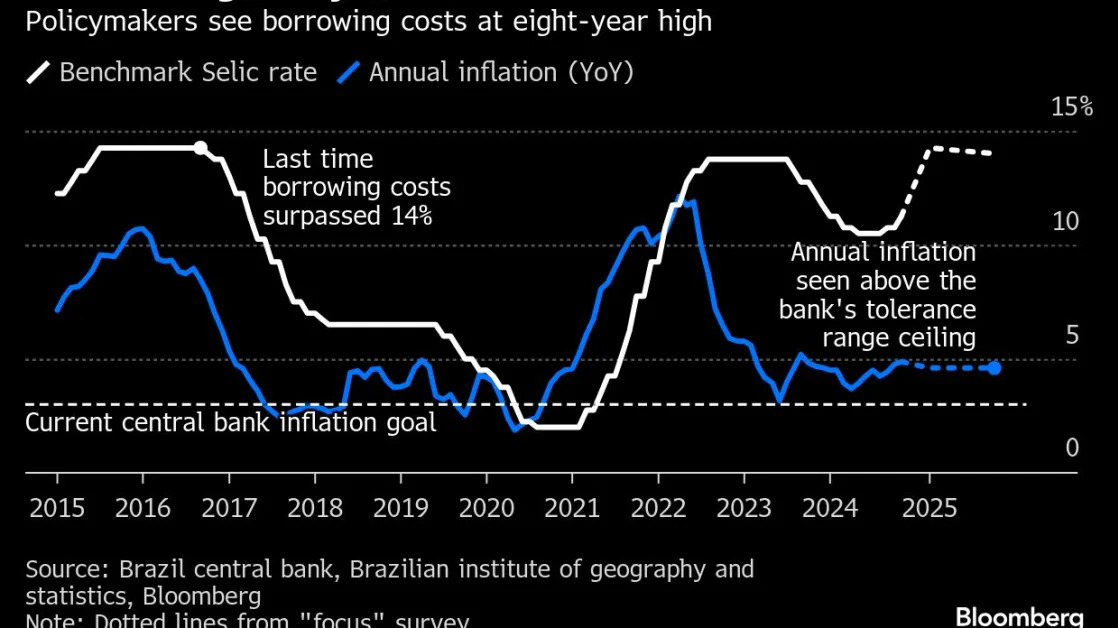(Bloomberg) -- Brazil’s central bank said inflation risks are materializing due to factors including a weaker currency and resilient demand, forcing the board to signal unanimously that borrowing costs will rise past 14% by March.
“Upside inflation risks, such as the resilience of services inflation, the deanchoring of expectations, and exchange rate depreciation, have materialized,” central bankers wrote in minutes to their Dec. 10-11 meeting, when they raised the benchmark Selic by a full percentage point to 12.25%. Several consumer price measures have deteriorated, making the convergence of inflation to the bank’s 3% target more challenging, they wrote.
This “less uncertain and more adverse” scenario “required a more timely policy action to maintain the firm commitment to converging inflation to the target,” they wrote in the document published on Tuesday.
The committee “unanimously decided to increase the Selic rate by 1.00 p.p. and to announce that, if the expected scenario confirms, it anticipates an adjustment of the same magnitude at the next two meetings.”
Policymakers led by Roberto Campos Neto have pledged two more hikes of the same size as annual inflation accelerates above both the 3% target and 4.5% tolerance range ceiling, with core measures also picking up. Food prices rose “significantly” on the back of severe drought while the costs of industrial goods are pressured by a weaker currency, central bankers wrote.
On top of that, economic activity has remained resilient, driven by stronger household consumption that’s getting a boost from record low unemployment and higher government spending. Policymakers say the risk of a worsening of services inflation, which is harder to tame, has also come to pass.
“There has been not only an interruption in the disinflationary process, but also a greater inflationary pressure in the latest readings,” board members wrote.
Policymaker’s communication was tough and hawkish, said Mirella Hirakawa, research coordinator at Buysidebrazil. “The outlook is one of strong activity, with an evident fiscal and credit momentum,” she said.
The central bank stepped into currency markets for the third straight day on Tuesday morning, after the Brazilian real weakened as much as 0.6% at the opening of the trading session, breaching 6.15 per dollar. Swap rates, which indicate investors sentiment toward monetary policy, rose over 10 basis points as traders continue to price in odds that the next borrowing cost increase in January will be larger than one percentage point.
Neutral Rate
In the minutes, central bankers lifted to 5% their estimate for the neutral rate, which neither restricts nor stimulates the economy. The board also pledged to monitor “more closely” how both a weaker real and the recent worsening of investors’ expectations are transmitted to consumer prices.
“Financial conditions and the exchange rate have undergone a sharp change recently,” the bank board wrote.
Investors were dismayed by a plan to cut 70 billion reais ($11.5 billion) in spending over the next two years after the government made the announcement together with tax breaks for poorer families. They have sold local assets such as the real, which has weakened roughly 20% this year and ranks as the worst performing major currency despite central bank intervention.
Meanwhile, Brazil President Luiz Inacio Lula da Silva reinforced his criticism of high rates on Sunday after an almost one-week stay at the hospital following brain surgery. “No one” has more fiscal responsibility than he does, Lula said in an effort to soothe market concerns about his push to keep the economy strong.
“The Committee remained firmly convinced that policies must be predictable, credible, and counter-cyclical,” central bankers wrote in the minutes. Investors’ negative perception to the most recent fiscal news “significantly” impacted asset prices, inflation expectations and Brazil’s risk premium, they added.
Last week’s decision was Campos Neto’s final monetary policy meeting. His successor, Gabriel Galipolo, who is a close ally of Lula, will assume as governor in January.
(Updates with central bank intervention in ninth paragraph)


